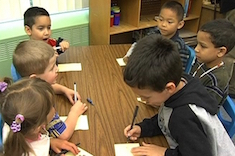Writing workshop: the hour block in the school day when writers of any age get together to compose, create, use their imaginations, and play with words. When I think of writing workshop, several words come to mind: planning, drawing, stories, books, scribbles, publishing, and conferring. I realized recently that several other words rarely came to mind—conversations, dialogues, voices, and negotiation. I wondered if I was hearing enough of my students’ voices during the workshop. Were my young writers working in isolation, or did they have support from other writers?
I was the kind of teacher who would put on some quiet music and let everyone write in solitude while I moved around the room conferring with students. I looked at my own life as a writer and realized I needed different kinds of support in my writing life. I need time to process information and read a lot before I can produce good writing. I need to talk to other writers about ideas and challenges. Sometimes all I need is to brainstorm and play with one idea for a long time. My process varies according to the writing I’m trying to get on the page. I realized I had to change several routines and expectations in my classrooms.
Here are some suggestions based on new strategies I’ve tried recently during writing workshop time with my young English language learners to help them develop strategies for sharing their writing and needs. They have helped me hear their voices, and I hope they work well for you.
Planning Your Writing
Have students turn to the person sitting next to them and briefly tell their classmate what they are working on during writing workshop. This does not mean the students read their entire writing piece to their neighbors; rather, they give them a quick overview. I post the following language stems as invitations:
Today in writing I will be . . . [working on the illustrations, adding a new chapter to my book, editing my work]
One idea I have for writing is . . .
I’m thinking about . . .
I’d like to write about . . .
I read and repeat these language stems before dismissing students to talk about their plans. Eventually, these language stems become internalized structures and part of students’ collaborative talk with classmates during workshops.
Feedback to the Writer
Every writer is different and writes at a different pace. Help students learn how to be independent and responsible for their writing life by teaching them to recognize when they need to talk to other writers to get feedback or ideas. Before we start writing workshop, I ask my young students, “Who would like to read their story to a friend?” or “Who would like to get ideas from other writers?” Then students meet together at a specific table and get the support they need. The process of sharing and receiving feedback must be modeled before students are able to accomplish this independently. The minilessons included teaching students to listen to the whole story read by the writer first. Then I teach students to ask themselves these questions:
- Do I understand what happened in the story my partner just read?
- Are there any confusing parts?
- What is my favorite moment in the story?
At the beginning of the year, we start with only three basic questions that writers ask each other. Young writers are still learning how to spot a confusing part in someone else’s story, so it takes practice and modeling. Sometimes I invite other teachers to my writing workshop minilesson to demonstrate what “feedback to the writer” looks like. This kind of presentation often becomes a favorite time for the students to watch two of their teachers model the process of writing and giving feedback.
Collaborating with Other Writers
I recognized that I needed to make “collaboration” part of our writing lives. Some of the minilessons that help students learn how to have these conversations are about providing some “accountable talk” language to guide them through this process. For example, students learn to ask other writers questions such as “What are you working on?” or “Who might I share this writing with?” or “I feel stuck in my story. What should I write next?” We practice this kind of language with each other (in partner work and small groups) until it becomes common in the classroom. I also have to be intentional and consistent in reminding students of the options they have as writers to talk with their classmates about work in progress. I say, “If you need to talk with another writer, this may be a good time to do so” at the beginning of the writing block and 15 minutes before sharing time.
Young writers teach me so much about what they need in order to write and learn. What are the voices in your classroom telling you? Lean in. I’m sure they have a lot to say.



